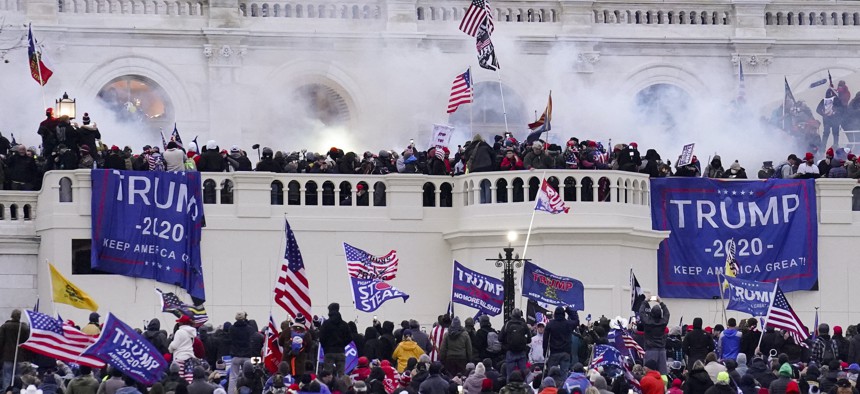Click ‘Like’, Get Punished Under Pentagon’s New Anti-Extremism Policy

Supporters of President Donald Trump storm the Capitol in Washington, Jan. 6, 2021. AP / John Minchillo
First update since 2012 adds rules for social-media behavior.
Service members could be punished for “liking” extremist content online under a new extension to the Pentagon’s anti-extremism policy that was prompted by the Jan. 6 attacks on the U.S. Capitol.
The policy is the result of a review launched by Defense Secretary Lloyd Austin shortly after he took office in January. The review aimed to discover the extent of extremism within the ranks, and to look at how the Pentagon can balance privacy rights with the need to prevent people who espouse extremist views from serving in uniform.
The new policy, a revision of DOD Instruction 1325.06, introduces the department’s first rules that specifically govern troops’ activities on social media, said a senior defense official who briefed reporters before the report’s release.
“It basically clarifies exactly that service members are responsible for the content that they publish on all personal and public internet domains. including social media sites, blogs, websites and applications,” the official said.
Under the new policy, “liking” extremist content could result in military punishment.
At a Pentagon briefing after the report’s release, press secretary John Kirby said the acts of clicking “like,” using certain emojis, or favoriting a site would violate the new extremism policy.
“The physical act of liking is, of course, advocating, right? And advocating for extremist groups, groups that advocate violating their oath to the Constitution, overthrow the government, terrorist activities… Liking is an advocation and that’s laid out clearly in the instruction,” Kirby said.
He said new training will teach all troops what social media activity is prohibited.
The new rules do not list online groups that troops are barred from joining. Instead, they specify proscribed actions.
“We were very conscious of not focusing on any particular ideology or any political organization focusing exclusively on actions,” a second senior defense official told reporters Monday.
As part of the review, the Pentagon tried to determine how many active duty troops were engaging in extremist behavior. The review found about 100 that were being investigated by the inspector general or the services’ criminal investigators, the officials said.
The officials who wrote the new policy considered crafting a new definition for extremism, but instead decided to clarify what behaviors would run afoul of military code.
The review also looked at how the department could effectively screen recruits and their online activity without violating free speech or privacy rights. Until a person officially enlists, they are still a private citizen.
“As of this time, we are not reviewing the social media content of recruits. We do ask a series of questions during the recruiter interviews, and then we do look extensively on past involvement with law enforcement include arrest charges, citations, parole, probation detention, We also do advanced fingerprint shots and an FBI name check, which serves as a preliminary screening for any history of this activity,” the official said.
Recruiters also look at things like body tattoos that might indicate membership in an extremist group.
Once a recruit officially joins the military, their actions, on and off duty, are subject to the UCMJ—including the new anti-extremism rules.
The review also recommended updates to a transition assistance program that aims to help people leaving the military stave off recruitment by extremist groups. A study released last week by the National Consortium for the Study of Terrorism and Responses to Terrorism, or START, found that former and some current service members have been involved in 458 crimes tied to extremism since 1990.
The Pentagon’s previous version of DOD Instruction 1325.06, issued in 2012, prohibited service members from participating in groups “that advocate supremacist, extremist, or criminal gang doctrine, ideology, or causes; including those that attempt to create illegal discrimination based on race, creed, color, sex, religion, ethnicity, or national origin; advocate the use of force, violence, or criminal activity; or otherwise engage in efforts to deprive individuals of their civil rights."



